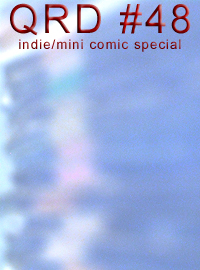
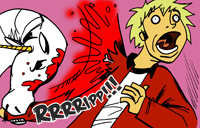
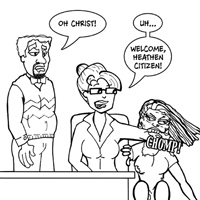
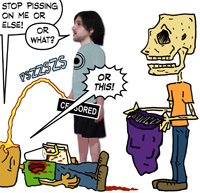
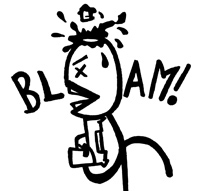
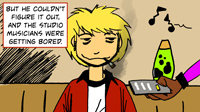
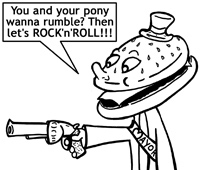
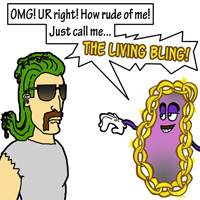
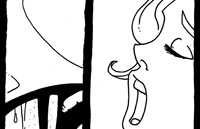
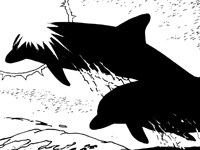




February 2011
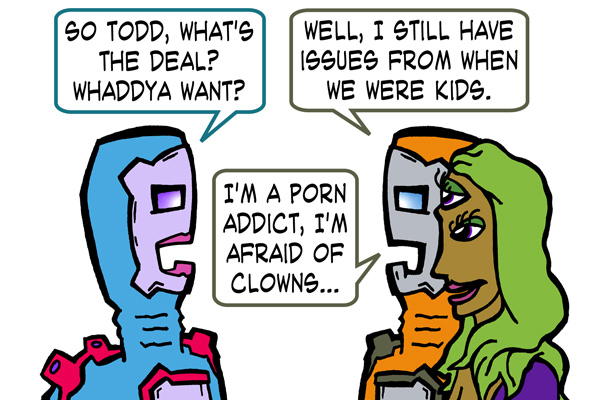
City: Pittsburgh, PA
Comics: Super Haters, Time Log
Websites: www.superhaters.com, www.nickmarino.net, timelog.audioshocker.com
QRD – How old were you when you first got into comics & did you always stick with them or did you come back to them?
Nick – My earliest memories consist of me pleading with my parents to buy me comics at the supermarket. As soon as I learned there was a place that ONLY sold comic books, I pleaded with my parents to take me there every weekend. Now I spend every day on the Internet pleading with other people to read my comics.
QRD – What was the first comic book you ever bought?
Nick – I can’t tell you for sure because I was too young to remember the transaction, but the two oldest comics to survive my childhood & remain with me today are Iron Man #203 & X-Men #202, so I guess it’s one of them.
QRD – How old were you when you put out your first comic?
Nick – I dunno. Probably in my early teens. But as an adult, I put out my first self-published ashcan at 25.
QRD – What decade do you think produced the best comics?
Nick – There’s stuff I like from every decade.
QRD – Why comics instead of just writing or drawing?
Nick – I ask myself the same thing every day. When you find a good answer, let me know.
QRD – Do you see mini-comics & indie comics as paths to mainstream comics or as their own unique media?
Nick – There’s so many ways to look at this question - as a reader, as a self-publisher, & as an artist. I’ll answer it in terms of my career goals: I self-publish right now because I want to make comics & create more opportunities for myself. If some of those opportunities are in mini-comics & indie comics, that’s great. If some of those opportunities are in mainstream comics, that’s also great.
QRD – How many copies of your comic do you print in your first run?
Nick – It depends on the nature of the work. I’ve gone as low as 15 & as high as 500.
QRD – How much do you think comics should cost?
Nick – Less than they cost right now!
QRD – How many books do you produce a year & how many would you like to?
Nick – Hmm... I never counted. Whatever the answer is, I’d like to triple it.
QRD – Do you think stories should be serialized or delivered as complete works?
Nick – Both. I love the thrill of serialization, but I also like the satisfaction of a complete story.
QRD – How are comic strips different than comic books & which medium do you prefer?
Nick – Strips typically require less panels & less space. To me, that means the story in a comic strip needs to be tighter & more efficient (in most cases but not all cases, of course), while I think comic books create an opportunity to explore time & space in a deeper way (again, in most cases). At this point in my life, I enjoy creating strips more than books.
QRD – How long is it from when you start a comic until it’s printed?
Nick – Anywhere from a few months to a few years.
QRD – What do you better with your comics now than when you first started?
Nick – Nowadays, I actually finish them! I used to start comics & then abandon them, but now I see things through on a more consistent basis.
QRD – At what point in the artistic process do you work digitally?
Nick – I still draw on paper nine times out of ten, but I do everything else digitally.
QRD – What do you think of digital comics & webcomics?
Nick – I like digital comics (by which I assume you mean digital issues & books), but I haven’t found a way to read them that I enjoy more than holding a book. Not because I like print very much, but because I like being able to take a book almost anywhere & hold it however I want, which is still lacking when it comes to affordable digital reading options. & I like webcomics a lot, but on the whole I prefer making them more than I enjoy reading them.
QRD – Do you prefer working in color or black & white?
Nick – Color.
QRD – How many different people should work on a comic & what should their jobs be?
Nick – I don’t think it matters how many people work on a comic, as long as everyone working on it feels invested in the final product.
QRD – How do you find collaborators?
Nick – Almost all of my writing collaborators have been my close friends before we started writing together. But most of my artistic collaborators are people that I’ve found online or met through mutual friends.
QRD – How tight do you think a script should be as far as telling the artist what to draw?
Nick – I don’t think there’s a good one-size-fits-all scripting style. I’ve found that some artists can manage to massacre a detailed script, while other artists don’t need much direction to produce something as good or even better than the original script. I think that the right script style depends on the collaborators & their relationship.
QRD – What comic book person would you be most flattered to be compared to?
Nick – If we’re talking artistically, I’d rather people enjoy my work without any deep knowledge of my inspirations & draw their own conclusions. But if we’re talking about personality? Hmmm… I could tell you people I don’t want to be compared to, but not necessarily the other way around!
QRD – What do your friends & family think of your comics?
Nick – My family as a whole rarely reads my comics, but they’re supportive of the process even when they’re indifferent to the content. I guess you could say they’re supportive from a distance. They know I make comics, but I’m not sure they understand what goes into it. My dad is a bit more involved than the rest & he’ll read any of my work that I put in front of him. But I have to ask him to read it - no one in my family ever says, “Hey, I was on your website & I read your comics,” without me having to send them a link first. Most of my friends are comics creators or comics readers & they’re all very encouraging. Plus, my friends are often my target audience.
QRD – What do you think of superheroes?
Nick – Superheroes are fun.
QRD – Marvel or DC?
Nick – The self-publisher & comics creator in me says both. The fan in me says Marvel.
QRD – What comic characters other than your own would you like to work with?
Nick – Bill & Ted. The Evan Dorkin series has been a big inspiration to me. Also, my friend has a comic he makes called Gello Apocalypse & I’d love to work with those characters.
QRD – Ideally would you self-publish?
Nick – YES! In a perfect world, I would successfully control every step of the process (well, maybe not printing & sales... I’m not so crazy about those two elements). But I love getting a book ready for print & I enjoy the challenge of distribution. & I love having complete control over the content.
QRD – What conventions do you try to attend & why?
Nick – Comics were always something I did on my own, all the way up through my mid-20s & conventions didn’t enter the picture until recently. I attended my first convention in 2008, so I don’t have any shows I’m fiercely loyal to yet.
QRD – What do you do to promote your books?
Nick – I maintain a few different websites that feature my work & I post on them frequently. I have a bi-monthly podcast called Sequential Underground where I talk with other indie creators about comics. I reach out to my friends as well as new readers through social media (Facebook, Twitter, Tumblr). I list my sites/comics in online webcomics directories. & I’ve experimented with a little low-cost online advertising here & there, too.
QRD – Do you think your comics are well suited to comic shops or would sell better elsewhere?
Nick – I think my comics fit in just about anywhere, from the most underground indie comic shop to the magazine racks at Target. They’re very bizarre, but also very accessible, in my opinion.
QRD – What other medium would you like to see some of your comics made into (television, film, games, action figures, etc.)?
Nick – First & foremost, I make my comics to be comics. I’m getting kind of sick of the mentality that comics have “made it” once they become live-action adaptations. With that said, I have no problem with the prospect of my work being adapted into other mediums, but I think it’s a bit premature on my part to speculate about that sort of thing.
QRD – Do you consider yourself a comic collector or a comic reader or both?
Nick – Reader. I’ve always been confused by the collector mentality where the condition is more important than the content.
QRD – What do you see as the most viable mediums for comics distribution 10 years from now?
Nick – Internet distribution, with a standard digital comics reader/ebook reader supplanting the tactile experience of reading printed floppies & GNs.
QRD – What would you like to see more people doing with comics?
Nick – More fun stories. More crazy shit. More disgusting & bizarre visuals. I mean, people read novels & they get to imagine what stuff looks like, right? I think the only way to really compete with that experience is by producing comics that surprise readers by delivering something beyond what they could have imagined on their own.
QRD – Anything else?
Nick – Check out my work! Super Haters
is my daily superhero satire webcomic at www.superhaters.com.
Time Log is my weekly time travel buddy comedy comic at timelog.audioshocker.com.
Also visit www.nickmarino.net for
weird sketches, project updates, & original music. & follow
my sci-fi novel’s (infrequently updated) production blog at www.soulboxer.com.
THX, Brian!!!
Other QRD interviews with Nick Marino:
Interview with comic creator & podcaster Nick Marino (October 2013)







